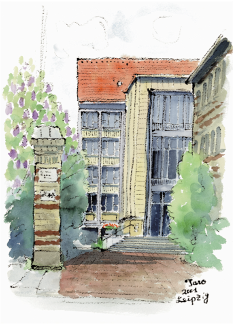Leipzig Spin Resonance Colloquium
Leipzig has historically been hosting a broad spectrum of research on spin resonance in physics, chemistry, biology, and medicine. Leipzig traditions in the subject go back to the time when Werner Heisenberg, Friedrich Hund, Edward Teller, and Felix Bloch worked there. At present, there are numerous groups at the Leipzig University and Max Planck and Leibniz Institutes conducting cutting-edge investigations that involve resonant response of electronic and nuclear spins in rather diverse contexts. As the spin resonance research within different fields grew increasingly specialized, it became an outstanding challenge both in Leipzig and internationally to facilitate the transfer of the accumulated expertise within the community. This challenge is taken up by the Leipzig Spin Resonance Colloquium, which offers a series of high-profile presentations organized by the Leipzig University to foster interdisciplinary environment among faculty and students. The Colloquium speakers should expect scientists of very different backgrounds to be present in the audience. We are asking the speakers to make an extensive introduction for non-experts, such that nuclear magnetic resonance presentations of physicists become accessible to biologists, or the presentations on the applications of magnetic resonance imaging in medicine are understandable to physicists, etc.. We further encourage the speakers to include at least a brief overview of an industry segment relevant to the scope of the presentation.
We cordially invite you to our Leipzig Physics Colloquium. Here you find our coming events:
The Leipzig Spin Resonance Colloquium takes place on Wednedays 4pm (CEST).
Coming Event
Zoom Seminar Room — May 12th 2021 — 4 pm (CEST)
"Faster NMR Diffusion Measurements"
Prof. William S. Price, Western Sydney University
The abstract and PDF-Flyer of the talk
If you don't have the passcode, please request it per email.
Colloquiums in Summer Semester 2021
| Date | Speaker | Topic |
|---|---|---|
| 28.04.21 | Prof. Eugene Demler | Bringing together quantum simulators and machine learning: quantum assisted NMR inference |
| 03.05.21 | Joint Colloqium with the MDR-Meeting | |
| 12.05.21 | Prof. William S. Price, Western Sydney University, Australia | Faster Diffusion NMR |
| 19.05.21 | Prof. P.K. Madhu, Tata Institute of Fundamental Research, India | Echo-Based Solid-State NMR Methods for Resolution and Geometry Parameters |
| 26.05.21 | Prof. Ville-Veikko Telki, University of Oulo, Finland | Ultrafast Laplace NMR |
| 02.06.21 | Prof. Sharon Ashbrook, University of St. Andrews, UK | Investigating Disorder in Solids using NMR Spectroscopy, Isotopic Enrichment and First-Principles Calculations |
| 09.06.21 | Prof. Dieter Suter, Technische Universität Dortmund, Germany | Hybrid magnetic resonance of individual spins in diamond NV centers |
| 16.06.21 | Prof. Bastiaan Driehuys, Duke University, Durham, USA | |
| 23.06.21 | tba | |
| 30.06.21 | fixed | |
| 07.07.21 | fixed | |
| 14.07.21 | Prof. Mark Ladd, DKFZ | tba |
Leipzig Spin Resonance Colloquium
Leipzig has historically been hosting a broad spectrum of research on spin resonance in physics, chemistry, biology, and medicine. Leipzig traditions in the subject go back to the time when Werner Heisenberg, Friedrich Hund, Edward Teller, and Felix Bloch worked there. At present, there are numerous groups at the Leipzig University and Max Planck and Leibniz Institutes conducting cutting-edge investigations that involve resonant response of electronic and nuclear spins in rather diverse contexts. As the spin resonance research within different fields grew increasingly specialized, it became an outstanding challenge both in Leipzig and internationally to facilitate the transfer of the accumulated expertise within the community. This challenge is taken up by the Leipzig Spin Resonance Colloquium, which offers a series of high-profile presentations organized by the Leipzig University to foster interdisciplinary environment among faculty and students. The Colloquium speakers should expect scientists of very different backgrounds to be present in the audience. We are asking the speakers to make an extensive introduction for non-experts, such that nuclear magnetic resonance presentations of physicists become accessible to biologists, or the presentations on the applications of magnetic resonance imaging in medicine are understandable to physicists, etc.. We further encourage the speakers to include at least a brief overview of an industry segment relevant to the scope of the presentation.
Format
- Online per Zoom
- 45 minutes talk + 15 minutes discussion
- Extended introduction also suited for students
Coordination
The technical coordinator of the colloquium is Dr. Robin Guehne.
